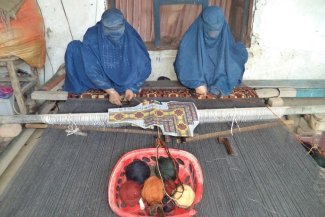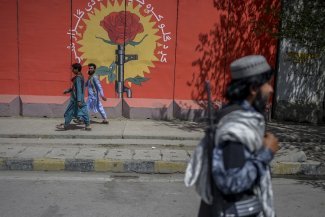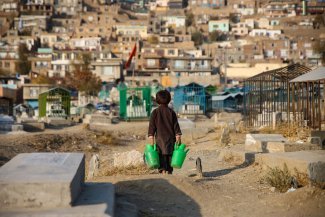
Members of Afghanistan’s Powerful Women Movement take part in a protest in Kabul on 10 May 2022. About a dozen women chanting ‘Your burqa is not my hijab,’ protested in the Afghan capital against the Taliban’s order for women to cover fully in public, including their faces.
The fifteenth of August 2021 is a day that Afghan women will never forget. For the first time in 20 years, the Taliban seized the capital city of Kabul, effectively regaining control of Afghanistan just a few months after US president Joe Biden announced his plans to withdraw American troops from the country. The lives of some 19.4 million women and girls have been upended ever since.
Despite the fundamentalist group initially pledging that it would not repeat the hard-line rule of the first Taliban government, which collapsed in 2001 after nearly five years in power following a US-led invasion, it reneged on its promise and has been dramatically rolling back women’s rights over the past 12 months.
To date, girls’ secondary schools have been closed ever since the Taliban took over the country, effectively keeping three million girls out of school; women have been barred from working most jobs, leaving the home or travelling without a male guardian; and women have been ordered to cover up their faces in public. The Taliban’s all-male cabinet excludes women from political participation and the government has shut down the Ministry of Women’s Affairs. Moreover, the women and girls of Afghanistan are under constant threat of gender-based violence.
“It has been a year of increasing disrespect for their right to live free and equal lives, denying them opportunity to livelihoods, access to health care and education, and escape from situations of violence,” UN Women executive director Sima Bahous stated on the one-year anniversary of the Taliban’s return to power.
But despite being deprived of their basic rights many Afghan women and girls have refused to accept exclusion from public life. More and more women are standing up to the Taliban regime, finding a multitude of ways to counter the draconian restrictions enforced on them.
Hoda Khamosh, 27, is a prominent women’s rights activist currently living in exile in Norway after receiving death threats. She launched several programmes to raise awareness of female health issues in Afghan schools before the Taliban returned, forcing her to flee the country in January of this year Before she left, she participated in numerous marches demanding women’s rights, including the women-led demonstrations organised after the fall of Kabul.
“The Taliban’s return brought women back to the Stone Age,” the activist, who is also a founder of the grassroots group Afghan Women’s Movement for Justice, tells Equal Times. “The voices of Afghan women made the world aware of the Taliban’s rights violations and the strict rules imposed on us,” she says. “Over the past year, most women have turned jobless and many others have been forced to leave”, she adds.
Earlier this year in January, Khamosh was invited to be part of a group of women activists to take part in a meeting in Oslo with Taliban officials to discuss the humanitarian and economic situation in Afghanistan. She used the opportunity to press the Taliban foreign minister to order the release of her two detained colleagues, Parwana Ibrahimkhel and Tamana Paryani, who had disappeared from peaceful protests held in the Afghan capital in mid-January. The two women were amongst four activists finally released in February.
Excluded from work and education
Keeping women out of school and work has not only endangered their lives but it also comes at a high cost to the Afghan economy. Denying girls secondary education costs Afghanistan 2.5 per cent of its annual GDP, according to new analysis from UNICEF. Even before the Taliban seized power, the war-torn country struggled with over 4.2 million children out of school, 60 per cent of them girls. Consequently, girls are exposed to increased risks of child marriage, early pregnancy, exploitation and abuse including child trafficking.
Additionally, restricting women’s access to work has generated an economic loss of up to US$1 billion, as a recent report from UNDP Afghanistan indicates.
Due to spiking food and fuel prices, an estimated 95 per cent of the population, almost all female-headed households, do not get enough to eat. Furthermore, constraints on women’s employment prevents half of the population from realising their full potential, while causing shortages of women teachers, doctors and nurses.
“Many female ex-soldiers, politicians, educators, doctors, journalists, NGO workers and activists have left the country fearing for their lives, and dozens of others are in hiding,” says Crystal Bayat, founder of an eponymous women’s rights organisation. “A lot of these women were the only breadwinners in their families. Today, they are starving and can hardly feed their children.”
A well-known human rights advocate, Bayat was among the organisers who led the early demonstrations for women’s rights just days after Kabul fell to the Taliban. The first of seven women protesters who publicly challenged the radical Islamist group, she too fled her homeland after receiving death threats.
Now living in the US, the 25-year-old is actively involved in providing Afghan women and girls the opportunity to study and receive an education. Through her charity, the Crystal Bayat Foundation, online classes are offered nationwide in Afghan Persian and Pashto. She aims to enrol 1,500 girls aged between 8 and 12 initially; more if they can secure the budget. This kind of initiative, although informal, is crucially important as the Taliban has transformed Afghanistan’s educational system by replacing modern secular education with religious schooling. “These girls have missed out on their education for a year now, I don’t want to see their time wasted any further,” Bayat affirms.
Determined to take back the freedoms they have lost
Last month, a movement of Afghan female activists, in cooperation with the Crystal Bayat Foundation, opened a library in Kabul to provide a space for women to access education and public life. The library, which received book donations from activists, teachers, writers and poets after garnering local and international press coverage, is home to more than 1,000 books covering a variety of topics including feminist literature, politics, history, economics and science. Its relatively high profile helps to keep those who work in and frequent the space safe.
“It’s the first physical icon of resistance in the face of Taliban orders. This library is about women’s presence in the public space,” Bayat explains. “It gives hope and encourages many more women to resist.”
Zhulia Parsi and Leila Basim, founders of the women’s library, also belong to the Spontaneous Movement of Afghan Women Activists. To mark the first anniversary of the recapture of the country by the Taliban, they, together with dozens of female demonstrators in Kabul, launched a street protest calling for food, work and freedom, which was repressed violently.
For the past year, women and girls who have protested for their rights have been “harassed, threatened, arrested, forcibly disappeared, arbitrarily detained and tortured,” according to a recent report by Amnesty International. Nevertheless, they are determined to take back the freedoms they have lost.
“Women are staging street protests, holding press conferences, organising activities, some are refusing to wear a hijab that fully covers their bodies and faces, while girls are attending schools secretly,” says Khamosh, noting the strong spirit of defiance driving Afghan women under the Taliban 2.0 regime.
Pashtana Durrani, a 24-year-old feminist human rights activist and teacher, founded LEARN Afghanistan four years ago to make education available to those Afghan girls without access to schools. Through her NGO, she has educated thousands and trained dozens of teachers in digital literacy.
When the Taliban swept back into power, LEARN was forced to close almost all of its programmes and move its activities underground. Durrani had to suspend her own studies at the American University in Kabul, went into hiding in her hometown of Kandahar, and spoke out against the closure of schools and universities.
It was not until November 2021 that she decided to escape to the United States after threats to her safety escalated. “My university was closed, I couldn’t go to my office, nor could I go to do field research on my own. I didn’t have anything else to do,” the educator says, remembering the first days of Taliban control in 2021.
“We need more educated women”
Speaking on the regression of women’s rights in Afghanistan, Durrani says: “Thirteen months ago in Afghanistan, I had a constitution. I could stand as an MP. I could vote, study, and run a business. Today, I have no constitution, I don’t have political representation, and above all, I don’t have the right to be educated and advance my social status,” she says.
As a visiting fellow at the Wellesley Centers for Women in Massachusetts, Durrani is now researching to help Afghan women and girls pursue education. She finished her degree at the American University in May, and runs LEARN remotely, eager as ever to advance female education. With most of its operations restricted on the ground, the organisation is only able to reach 400 girls aged 13 to 18 in secret schools. “We are making sure that these young girls don’t fall behind. We need more educated women in the future,” the teacher affirms.
Confident that the Taliban won’t succeed in silencing the women of Afghanistan, she reiterates that women continue to work from home, that some girls are escorted by male relatives to school, and they keep coming out on the streets. “This is possible because, as Afghan people, we believe our country is much more than a few people thinking they can control the population.”
The Taliban’s record of female suppression has left many women activists unconvinced of their promises that women will soon be able to work, girls will be able to return to school, and both will be able to travel without a male guardian. Bayat and Durrani both express their disappointment that no one in the international community has made a real effort to pressure the Taliban leadership. Instead, they assert, the US and European part-ners have engaged – albeit reluctantly – with the ultra-conservative faction as the only in-ternal stakeholder in Afghanistan. But Bayat is defiant, affirming that if the Taliban are struggling to gain international legitimacy, it is “thanks to the voices of Afghan women” who have raised the alarm to the world.












